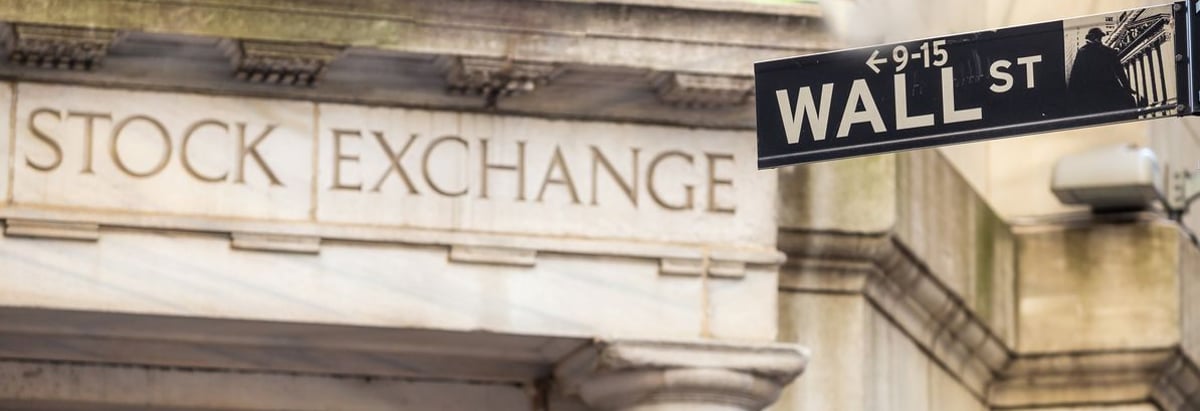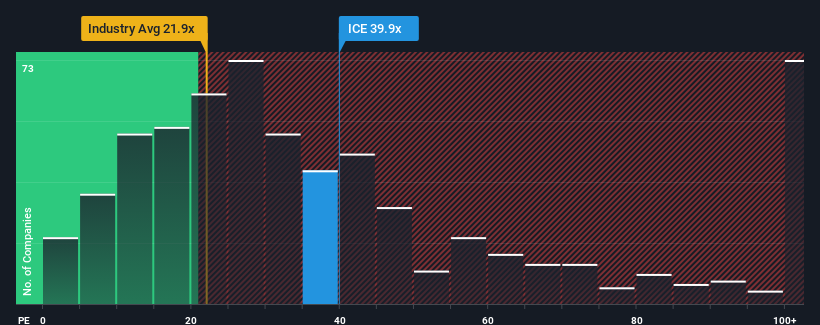- United States
- /
- Capital Markets
- /
- NYSE:ICE
Investors Interested In Intercontinental Exchange, Inc.'s (NYSE:ICE) Earnings

Intercontinental Exchange, Inc.'s (NYSE:ICE) price-to-earnings (or "P/E") ratio of 39.9x might make it look like a strong sell right now compared to the market in the United States, where around half of the companies have P/E ratios below 18x and even P/E's below 10x are quite common. However, the P/E might be quite high for a reason and it requires further investigation to determine if it's justified.
Recent times have been pleasing for Intercontinental Exchange as its earnings have risen in spite of the market's earnings going into reverse. The P/E is probably high because investors think the company will continue to navigate the broader market headwinds better than most. If not, then existing shareholders might be a little nervous about the viability of the share price.
View our latest analysis for Intercontinental Exchange

Is There Enough Growth For Intercontinental Exchange?
In order to justify its P/E ratio, Intercontinental Exchange would need to produce outstanding growth well in excess of the market.
Retrospectively, the last year delivered an exceptional 34% gain to the company's bottom line. Still, incredibly EPS has fallen 20% in total from three years ago, which is quite disappointing. Accordingly, shareholders would have felt downbeat about the medium-term rates of earnings growth.
Shifting to the future, estimates from the analysts covering the company suggest earnings should grow by 15% per year over the next three years. With the market only predicted to deliver 10% per year, the company is positioned for a stronger earnings result.
With this information, we can see why Intercontinental Exchange is trading at such a high P/E compared to the market. Apparently shareholders aren't keen to offload something that is potentially eyeing a more prosperous future.
What We Can Learn From Intercontinental Exchange's P/E?
Typically, we'd caution against reading too much into price-to-earnings ratios when settling on investment decisions, though it can reveal plenty about what other market participants think about the company.
We've established that Intercontinental Exchange maintains its high P/E on the strength of its forecast growth being higher than the wider market, as expected. Right now shareholders are comfortable with the P/E as they are quite confident future earnings aren't under threat. Unless these conditions change, they will continue to provide strong support to the share price.
It is also worth noting that we have found 2 warning signs for Intercontinental Exchange (1 can't be ignored!) that you need to take into consideration.
If these risks are making you reconsider your opinion on Intercontinental Exchange, explore our interactive list of high quality stocks to get an idea of what else is out there.
New: AI Stock Screener & Alerts
Our new AI Stock Screener scans the market every day to uncover opportunities.
• Dividend Powerhouses (3%+ Yield)
• Undervalued Small Caps with Insider Buying
• High growth Tech and AI Companies
Or build your own from over 50 metrics.
Have feedback on this article? Concerned about the content? Get in touch with us directly. Alternatively, email editorial-team (at) simplywallst.com.
This article by Simply Wall St is general in nature. We provide commentary based on historical data and analyst forecasts only using an unbiased methodology and our articles are not intended to be financial advice. It does not constitute a recommendation to buy or sell any stock, and does not take account of your objectives, or your financial situation. We aim to bring you long-term focused analysis driven by fundamental data. Note that our analysis may not factor in the latest price-sensitive company announcements or qualitative material. Simply Wall St has no position in any stocks mentioned.
About NYSE:ICE
Intercontinental Exchange
Provides technology and data to financial institutions, corporations, and government entities in the United States, the United Kingdom, the European Union, India, Israel, Canada, and Singapore.
Proven track record average dividend payer.


